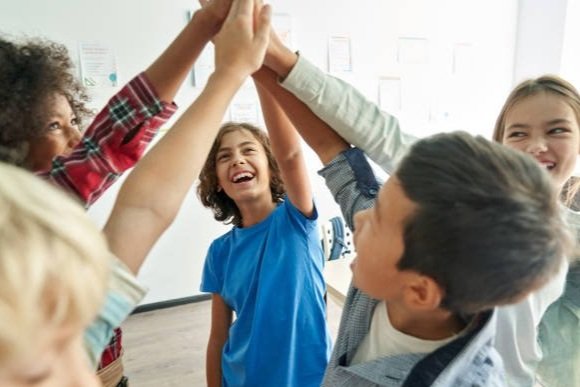Practice Restorative
Practice Restorative is a company that educates about, incorporates and applies Restorative Practices and Communication for Connection in our workplaces, schools and all places where humans interact.
Testimonials:
“Molly has been my champion in introducing me to restorative practices and laying the foundation for my own facilitation. Without my initial training from Molly, our coaching sessions, and her communication for connection training, I'm not sure where I would be today. Molly is a great leader of restorative work here in Kalamazoo.”
-Nonprofit leader
*********************************************************
“This training was not something I initially thought I needed but now I want everyone to take it! This mindset shift is valuable professionally and personally. Molly is such a great instructor that she passed her passion onto me.”
-Bronson Employee
If you are seeking:
Positive workplace and school culture and climate
Better interpersonal relationships
More trust and collaboration
Confidence around resolving conflict effectively
Practice Restorative can help!

“Molly leads weekly circles at Legacy House, a housing program for LGBTQ+ young adults transitioning out of homelessness. These circles have been instrumental in helping our residents build trust, empathy, and community with one another. Additionally, Molly's training on Restorative Conversations has given my staff a strong foundation from which to work as they support our residents on a day-to-day basis, using restorative practices to turn conflicts into opportunities for connection.”
– Heather Sanford, Legacy House Manager

What are Restorative Practices?
Restorative Practices come from an emerging social science, rooted in Indigenous teaching, that focuses on the importance of relationships and community. They offer tools and practices that empower us to build stronger communities, communicate more effectively and approach conflict as an opportunity for growth.
With the use of Restorative Practices and Communication for Connection, we are visualizing a new reality: one that relies on positive relationships, healthy communication, real accountability, fairness, positive engagement and meaningful conflict resolution. The hope is to create a positive climate in our communities — schools, workplaces, wherever people gather —-and promote equitable, healthy relationships between all members of the community.
Restorative tools and practices include the following:
-
Highlights the importance of relationships and connection, shifts our thinking on conflict and “right and wrong,” places value on different perspectives
-
A way to communcate, closely aligned with Communication for Connection (see side block) that is welcoming, positive and sets expectations in less authoritarian, more engaging way
-
A versatile tool used to build community, strengthen relationships, have fun, celebrate accomplishments, and brainstorm ideas
-
Open-ended questions that help us to be more engaged and learn from people around us; an alternative set of questions that can be used to resolve conflict
-
A framework for communication aligned with Communication for Connection (see side block). Opens pathways to healthy conversation and better connection
-
An informal model for handling low-level conflict or behavior concerns that emphasizes listening and problem-solving
-
A more structured process used to manage higher-level conflict, reduce suspensions and disciplinary referrals
-
A leadership tool that models inclusive decision-making
What is Communication for Connection?
Communication for Connection is rooted in the theory of Nonviolent Communication (NVC). It provides a framework for communication that is rooted in empathy and connection to meet both our own and other people’s needs.
Communication for Connection is a powerful tool with a variety of applications, from personal to workplace to social change. It helps transform anger, destructive attitudes and habitual behaviors into more peaceful, life-serving words and actions.
Communication for Connection can help us communicate more effectively in the following ways:
Develop an emotional vocabulary
Stay connected to your feelings and needs
Break negative, habitual patterns of thinking and communicating
Hear the needs behind other people’s behavior
Get to the heart of conflict quickly
Make clear, doable requests
Listen more effectively
Lead more effectively
Give authentic feedback
Improve the effectiveness of a team
“We can make our life miserable or wonderful for ourselves and others depending upon how we think and communicate.”
What We Believe at Practice Restorative
Humans are hard-wired to connect, and focusing on the communities and relationships around us is important work
When people can be authentic and open to learning about others, our commitment to each other deepens
Although conflict is hard, with the proper tools and mindset it is an opportunity for growth
Our Values:
CONNECTION, INCLUSIVITY, COMMUNITY, COURAGE AND GROWTH

Hello, World!
Schools and Youth Organizations
Build a stronger school community, learn and teach healthy communication skills, manage conflict more effectively, foster a positive learning environment
Workplaces and Nonprofits
Build and repair heathly and equitable relationsips, boost employee retention, manage difficulties with fairness, foster a supportive environment
Community and Church Groups
Honor inclusivity by valuing different voices and perspectives, strengthen relationships, create space for growth and change
A little about Molly Mechtenberg, founder of Practice Restorative:
Molly’s journey in this field began almost ten years ago with Kalamazoo-based nonprofit Gryphon Place, when she was hired as a Youth Conflict Resolution Specialist for Kalamazoo Public Schools. After years of experience as a facilitator in numerous area schools and mentoring under a local Restorative Justice trainer, Molly began offering Restorative Practices trainings in local schools and organizations. Molly has been connecting with people all over Southwest Michigan since. She brings years of experience, a true passion for this work and a commitment to bringing Restorative Practices to our community in an authentic way.

“The fundamental premise of restorative practices is that people are happier, more cooperative and productive, and more likely to make positive changes when those in authority do things WITH them, rather than TO them or FOR them.”
--Ted Wachtel, International Institute for Restorative Practices
Contact Us
To learn more or start a conversation, do not hesitate to reach out! Thank you for your interest.






